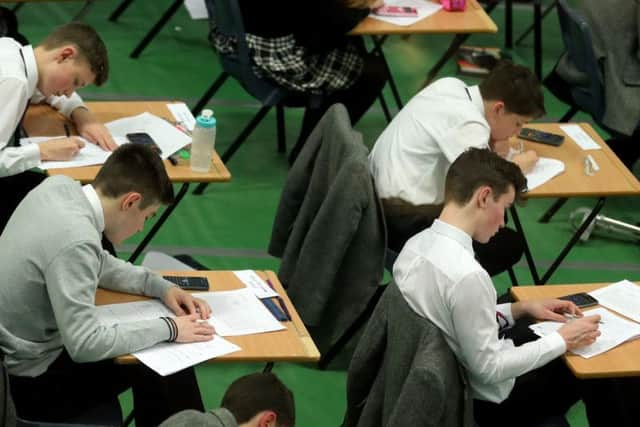None of the main parties have properly evidenced plans over education, report finds
The Education Policy Institute (EPI), funded by the Nuffield Foundation, carried out an analysis of the manifesto education plans of the Conservatives, Labour, Liberal Democrats, Greens and the Brexit Party, assessing how their policies would affect England.
Researchers found that although all parties have made bold pledges about reducing opportunity gaps and raising educational attainment, the policies in their manifestos are unlikely to deliver on these aspirations.
Advertisement
Hide AdAdvertisement
Hide AdIt comes as Fiona Spellman, CEO of Leeds-based education charity SHINE said: “Tackling the disadvantage gap in education must be a top priority for whichever party is in power.”


The EPI found that despite a large proportion of the attainment gap between poor children and the rest emerging before entry to school, party policies seem to focus on improving childcare for employment and cost of living reasons, rather than focusing on high quality early years education.
The group said major parties are pledging additional funding for schools, colleges and special needs education - with Labour and the Greens committing to the biggest increases.
The researchers said this could help to deliver effective interventions and may improve teacher retention, but under Conservative policies there will be a relative shift in funding away from schools with higher levels of disadvantage - and this attempt to “level up funding” could widen the disadvantage gaps in attainment.
Advertisement
Hide AdAdvertisement
Hide AdBoth Labour and the Liberal Democrats may have underestimated the cost of their policies on free school meals, and this could require funding to be diverted from other parts of the schools budget.
Ms Spellman said: “In the North particularly, there is a risk that our most disadvantaged children are being forgotten by an education system that too often fails to recognise and address their specific needs.
“We must ensure that the political decisions which affect our children are based on the evidence of what is most effective, and that new policies are much more rigorously tested before mass adoption.
“There are significant resourcing pressures at all stages of our education system, and any commitment to additional funding for schools is, of course, to be welcomed.
Advertisement
Hide AdAdvertisement
Hide Ad“However, the truth is, the most significant barriers facing children from disadvantaged backgrounds often lie beyond the school gates. More money for our schools is certainly necessary for improving outcomes, but it is only one part of the solution.
“Teachers are doing a fantastic job supporting our children, often despite the policy environment rather than because of it. Politicians of different persuasions must be prepared to work together in the interests of the least advantaged children.
“After so many years of our political system trying and failing to fix this issue, it’s time we tried something different.”
The EPI said major parties are pledging additional funding for schools, colleges and special needs education - with Labour and the Greens committing to the biggest increases.
Advertisement
Hide AdAdvertisement
Hide AdThe researchers said this could help to deliver effective interventions and may improve teacher retention, but under Conservative policies there will be a relative shift in funding away from schools with higher levels of disadvantage - and this attempt to "level up funding" could widen the disadvantage gaps in attainment.
Both Labour and the Liberal Democrats may have underestimated the cost of their policies on free school meals, and this could require funding to be diverted from other parts of the schools budget, the analysis found.
The current system of accountability is in need of improvement, the EPI said, but added that education research suggests that Labour and Liberal Democrat plans to scrap primary tests and move to lower stakes inspection could damage attainment, and might particularly pose a risk to improving outcomes for the most vulnerable learners.
The EPI said the Conservatives do not commit to improving the current system or addressing any of its negative incentives and impacts.
Advertisement
Hide AdAdvertisement
Hide AdParty policies on post-18 education are particularly disappointing, the researchers said, adding that Labour proposes that its most expensive education policy should be allocating around £7bn to scrap university tuition fees, even though this may not improve participation or the access of vulnerable groups.
Researchers said the Conservatives offer few policies on higher education, and the one concrete measure, reduced interest rates on student loans, would disproportionately benefit higher earners.
The EPI said that while all parties are committed to additional education funding over the years ahead, there is a high level of uncertainty about the revenues which have been earmarked for such funding.
The Conservative plans assume that the growth impact of Brexit will be moderate, and the Labour plans assume the same, and also rely upon large tax revenues from a limited number of sources, researchers said.
Advertisement
Hide AdAdvertisement
Hide AdThe analysis found the Lib Dems are banking on a "Remain Bonus", and revenues from uncertain sources such as tax avoidance.
The EPI concluded that with all parties, it is unclear how education spending plans would be altered if revenues prove less robust than planned.
Natalie Perera, executive director and head of research at the EPI, said: "All of the main parties are united by one thing - bold ambitions to raise attainment and close gaps.
"However, our analysis shows that while each party has some well-designed and helpful policies, none has a properly evidence-based strategy to meet their ambitions.
Advertisement
Hide AdAdvertisement
Hide Ad"In order to address the inequality gap at age 16, parties should commit to policies which build on the evidence of what works, which includes high quality early years education and ensuring that children in the most disadvantaged schools have access to the best teachers."
Jon Andrews, deputy head of research and the report's lead author, said: "EPI's analysis highlights that no party has produced a robust, evidence based, set of policies across the board which would be likely to significantly increase attainment and reduce the current, large disadvantaged gaps."